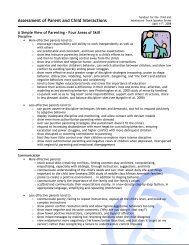Center for Academic Excellence Writing Assessment ... - eGo Main
Center for Academic Excellence Writing Assessment ... - eGo Main
Center for Academic Excellence Writing Assessment ... - eGo Main
Create successful ePaper yourself
Turn your PDF publications into a flip-book with our unique Google optimized e-Paper software.
The Atlantic Online | June 2009 | What Makes Us Happy? | Joshua Wolf Shenk<br />
12/31/09 10:15 PM<br />
This means that a glimpse of any one moment in a life can be deeply misleading. A man at 20 who appears the model of<br />
altruism may turn out to be a kind of emotional prodigy—or he may be ducking the kind of engagement with reality that his<br />
peers are both moving toward and defending against. And, on the other extreme, a man at 20 who appears impossibly<br />
wounded may turn out to be gestating toward maturity.<br />
Such was the case, Vaillant argues, with “Dr. Godfrey Minot Camille,” a poetic and troubled young man who spent so much<br />
time at the Harvard infirmary complaining of vague symptoms that a college physician declared, “This boy is becoming a<br />
regular psychoneurotic.” He’d grown up in a frigid environment—he ate his meals alone until age 6—and spoke of his<br />
desolation with heartbreaking clarity. A member of the study staff advised him: “When you come to the end of your rope, tie<br />
a knot and hold on.” He replied: “But the knot was tied so long ago, and I have been hanging on tight <strong>for</strong> such a long time.”<br />
After graduating from medical school, he attempted suicide.<br />
With the help of psychotherapy and with the passage of time, his hypochondria eased and he began to show “displacement,”<br />
the strategy of shifting preoccupations from a painful source to more neutral ground. When his sister died, he sent her<br />
autopsy report to the Grant Study office, with a cool note saying that he expected it would be “an item of news.” He reported<br />
another family death this way: “I received an inheritance from my mother.”<br />
For Camille, such detached neutrality seemed to herald progress. At 35, he spent 14 months in a hospital <strong>for</strong> an infection and<br />
had what he described as a spiritual awakening. “Someone with a capital ‘S’ cared about me,” he wrote. Afterward, he<br />
bloomed as a psychiatrist, channeling his own needs into service. He said he liked the “distant closeness” of psychotherapy—<br />
and liked getting paid <strong>for</strong> it. As a child, he had fantasized about being a minister or physician. “Finally, at age <strong>for</strong>ty, wish<br />
became behavior,” Vaillant wrote.<br />
In his 2002 book, Aging Well, Vaillant returned to this man’s story, this time calling him “Ted Merton” to emphasize his<br />
spiritual development. (The men in Vaillant’s books always have florid pseudonyms—Horace Lamb, Frederick Lion, Bill<br />
Loman, etc.) In several vignettes in the book, Vaillant presents Merton as an exemplar of how mature adaptations are a reallife<br />
alchemy, a way of turning the dross of emotional crises, pain, and deprivation into the gold of human connection,<br />
accomplishment, and creativity. “Such mechanisms are analogous to the involuntary grace by which an oyster, coping with<br />
an irritating grain of sand, creates a pearl,” he writes. “Humans, too, when confronted with irritants, engage in unconscious<br />
but often creative behavior.”<br />
But “creative” doesn’t equate to ease. At ages 55 and 60, Merton had severe depressions. In the first instance he was<br />
hospitalized. The second instance coincided with his second divorce, and “he lost not only his wife, his savings, and his job,<br />
but even his network of professional colleagues.” Going <strong>for</strong>th into the breach of life can deepen meaning, but also deepen<br />
wounds.<br />
Case No. 158<br />
An attractive, amiable boy from a working-class background, you struck the study staff as happy, stable, and sociable.<br />
“My general impression is that this boy will be normal and well-adjusted—rather dynamic and positive,” the psychiatrist<br />
reported.<br />
http://www.theatlantic.com/doc/print/200906/happiness<br />
Page 9 of 20





